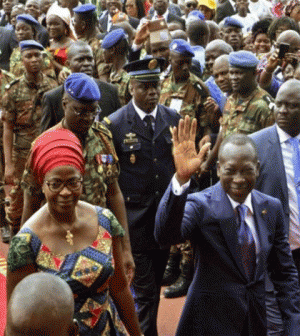- Finding Unshakable Power in a World That Wants to Pull Us ApartPosted 6 months ago
- What could a Donald Trump presidency mean for abortion rights?Posted 6 months ago
- Financial Empowerment: The Game-Changer for Women in Relationships and BeyondPosted 7 months ago
- Mental Health and Wellbeing Tips During and After PregnancyPosted 7 months ago
- Fall Renewal: Step outside your Comfort Zone & Experience Vibrant ChangePosted 7 months ago
- Women Entrepreneurs Need Support SystemsPosted 7 months ago
First ladies vow to fight "barbaric" genital mutilation in W. Africa

By Emma Batha
ROME, Jan 30 (Thomson Reuters Foundation) – The first ladies of Niger, Burkina Faso and Benin promised on Monday to “end the scourge of female genital mutilation” (FGM) in their countries amid warnings the practice had gone underground in Benin.
“FGM is a barbaric practice,” Niger’s Lalla Malika Issoufou told an international conference on FGM in Rome.
She said Niger’s president, Mahamadou Issoufou, was fully behind efforts to eradicate the ritual and that the country was looking at bolstering its law.
Worldwide, an estimated 200 million girls and women have been subjected to the ancient ritual which usually involves the partial or total removal of the external genitalia. It is often carried out by traditional cutters.
The internationally condemned practice is rooted in the wish to control female sexuality, but beliefs around it vary. Some communities see it as a prerequisite for marriage.
Most African countries have introduced laws against FGM, although these are generally poorly enforced.
The first lady of Benin, Claudine Talon, said cutters had found ways around the law.
“The phenomenon (FGM) has become an underground one,” she said in a statement read out by her adviser Pounami Doko Toko.
Doko Toko told the Thomson Reuters Foundation the ritual which was once done openly was now performed behind closed doors.
Parents were also getting their daughters cut at a much younger age before they had learnt to speak – a trend seen in several other African countries.
Some girls in Benin were now cut shortly after birth whereas in the past they would have been cut around the age of 11, she said.
Families were also circumventing the law by crossing into neighbouring Burkina Faso or Niger to get their girls cut.
POLITICAL WILL
U.N. statistics show 9 percent of girls and women have undergone FGM in Benin, but Doko Toko said she believed the real figure was two to three times higher.
She said there had been a significant drive to end FGM in Benin up until 2006, but little action since.
Some young women who did not have FGM when they were girls are now asking to be cut because they cannot find a man willing to marry them, she said. Cutters who had previously abandoned the practice have also resumed their work.
But Bernice Noudegbessi, an official with the U.N. population fund (UNFPA) in Benin, said there was a new political will in the country to tackle FGM.
The FGM prevalence rate in Niger is 2 percent, according to U.N. data, but the first lady said it was very common in some areas.
International campaigners have praised Burkina Faso for its efforts to eradicate FGM, which is practised by both Muslim and Catholic communities.
Although three quarters of girls and women have had FGM, only 13 percent of under-15s have been cut.
The country has carried out hundreds of prosecutions and set up a hotline where people can inform the authorities if they hear FGM is about to happen.
The first lady of Burkina Faso, Sika Kabore, said boosting girls’ education, literacy and independence was crucial in fighting FGM and child marriage.
“Great steps have been taken but there’s a long way to go,” she said in a statement read out at the BanFGM conference.
(Editing by Astrid Zweynert; Please credit the Thomson Reuters Foundation, the charitable arm of Thomson Reuters, which covers humanitarian news, women’s rights, trafficking, corruption and climate change. Visit news.trust.org to see more stories.)






